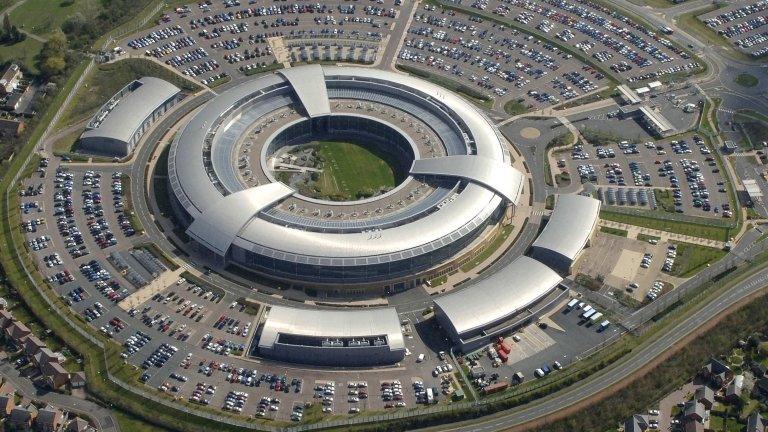GCHQ v tech firms: Net reacts to security director's article
- Published

GCHQ faces having to deal the increased use of encryption following allegations of its activities by whistleblower Edward Snowden
An article by British spy agency GCHQ's new director, which suggests leading tech firms have become "command-and-control networks of choice for terrorists" and that they need to do more to facilitate investigations, has sparked debate online.
While some have welcomed Robert Hannigan's call, external for a "public debate about privacy", there is suspicion from others that his article foreshadows the government extending his agency's surveillance powers whatever the outcome of the suggested discussions.
Below are a selection of the reactions posted online by the media, privacy campaigners and public:

Newspapers and blogs:

Mr Hannigan worried that sophisticated encryption tools that were once reserved for nation states are now offered to smartphone users as standard
The message may prove a winner to many people who hear it, who share the view that further powers are needed to tackle the extremist threats faced by the UK at home and abroad. But to those who in the aftermath of the surveillance revelations of the past year hoped for serious engagement and debate, there seemed little to clutch to in this. Hannigan may be thumping the table harder than his predecessors, but the content of his message remains almost entirely the same.
The fact that Hannigan has spent his first day firing off a public-relations broadside on this issue shows quite how worried the security services are about the proliferation of communications they can't easily tap... While backdoors might keep the spies happy, sales of devices and cloud services would plummet should word get out that US tech giants were willing partners in mass surveillance.

Robert Hannigan's article coincided with him taking over the role of GCHQ's director
Privacy is a right, Europe says, and there's no getting out of it... In the game of government to Silicon Valley cat-and-mouse, the mice are ahead of their predators. And while GCHQ's Hannigan has a right to debate, he doesn't have a right to complain.
It's great to hear that Hannigan wants GCHQ to "enter the public debate" on the issue. In public is precisely the place where these matters should be decided: not in the secrecy of the Cheltenham doughnut, nor the obscurity of Silicon Valley's boardrooms.
The same tools used by extremists are free to the rest of us too. That gives all of us both the opportunity and responsibility to defend what it is we believe... The battle for ideas online can't be won, or even fought, by governments. It's down to us.
There is still just public anger at the way that governments were monitoring web activity and there is still a significant lack of trust within the tech community - the response has been to lock down as much as possible. However, I am not convinced that Hannigan's piece is being received as it was intended - I don't see how a person asking for an open dialogue is asking for a fight.
It's one thing to be opposed to the likes of [Islamic State], it's quite another to be amenable to having one's entire communication snooped into. GCHQ's sudden decision to enter the privacy debate is interesting, but it's not clear that it will actually amount to anything.
Spy agencies are right to be frustrated by the lack of co-operation from Google, Facebook and others... It seems to me that this will require legislation to correct, since the companies concerned have proven themselves incapable of acting sensibly of their own volition, and of listening to their own customers, the majority of whom, if asked, would surely be appalled that their family photos and private messages are sharing a platform with people who want to destroy our way of life.

Campaign groups:

Mr Hannigan said that GCHQ needed greater support from the "largest US technology companies which dominate the web"
Jim Killock, Open Rights Group:, external
It should be down to judges, not GCHQ nor tech companies, to decide when our personal data is handed over to the intelligence services. If Hannigan wants a "mature debate" about privacy, he should start by addressing GCHQ's apparent habit of gathering the entire British population's data rather than targeting their activities towards criminals.
Shami Chakrabarti, Liberty:, external
Mr Hannigan shouldn't grab the megaphone whilst wearing the headphones or use threats and smears that ignore due process and the rule of law. Rather than trashing our best traditions for convenience, the UK should lead the way on improving lawful access to data between states in the fight against terrorism.
Eric King, Privacy International:, external
It's disappointing to see GCHQ's new director refer to the internet - the greatest tool for innovation, access to education and communication humankind has ever known - as a command-and-control network for terrorists... Robert Hannigan is right, GCHQ does need to enter the public debate about privacy - but attacking the internet isn't the right way to do it.

Twitter:

Mr Hannigan's article said that Islamic State sent 40,000 tweets a day during the advance on Mosul without triggering spam control
GCHQ Dir says some painful truths @20committee, external (John Schindler, author and former National Security Agency (NSA) analyst)
"Privacy never an absolute right" in spook, translates as "state shall be able to invade privacy if convenient, without particular reason" @CasparBowden, external (security researcher and privacy rights campaigner)
I wouldn't mind betting the discussion turns into banning encryption or handing over keys. What have you got to hide, plebs? @rossmasters, external (software developer)
No terrorist or criminal worth their salt is going to use Facebook or Twitter for comms. Propaganda yes, comms no. #GCHQ @jerryhat, external
Sadly, despite suggesting they're up for a debate on privacy, head of GCHQ unavailable for interview. @tomcheshiresky, external (Sky News technology correspondent)
To be fair Robert Hannigan is right to say GCHQ needs to enter public debate about privacy, and to show how it's accountable... There are things that make me uneasy in his op-ed, but this debate has to engage somewhere. @williamheath, external (chairman of personal data specialists Mydex)
Anything "hackable" by #GCHQ will be "hackable" by criminals. #Security services destroyed any #trust they had with mass data collection @PraxisReform, external

Reddit:

Mr Hannigan warned that Islamic State jihadists were using the net to intimidate people and radicalise new recruits
It's kind of ironic that governments which support mass surveillance and the breach of their citizens' privacy are the ones which will respond the most violently when their secrets are probed or revealed. Akesgeroth, external
He's not entirely wrong. Privacy is not an absolute right in Britain. The fourth amendment of the US Constitution was written with the government of the UK in mind. Yeeeuup, external
This move by GCHQ and the FBI to move technology backwards is pointless. The best analogy would be the Church's attempt to make crossbows illegal, because they had a disturbing tendency to undermine the idea that God would appoint the victor of armed combat. loteknick, external
One thing is true: This is best served as a public debate. bull_god, external
Why should we all be subjected to mass surveillance? This to me is being treated as guilty for using the internet because of a few morons in society. Privacy tools (Tor, Tails etc) exist because there is powers out there that abuse their privileged positions. Maybe if GCHQ, NSA weren't such abusive agencies then less people would use privacy tools in the first place. dan_devs_uk, external
There should be a mature discussion for this, we need a middle ground where people's right to privacy is protected, but there should be a transparent framework in place for security agencies to do their jobs too. ktechmidas, external
Terrorists have been using strong encryption for years. It's worrying that as soon as the general public start using it, GCHQ throws their toys out of the pram. sonicated, external
- Published4 November 2014

- Published8 October 2014
